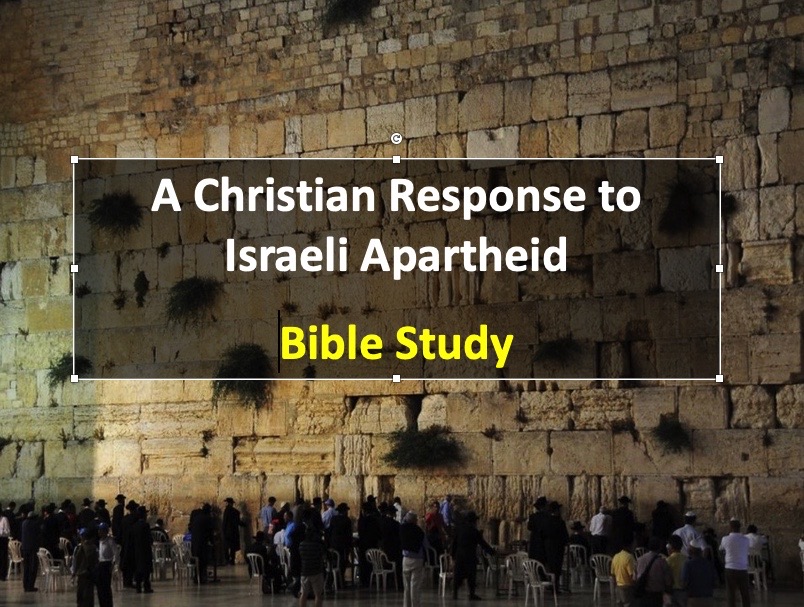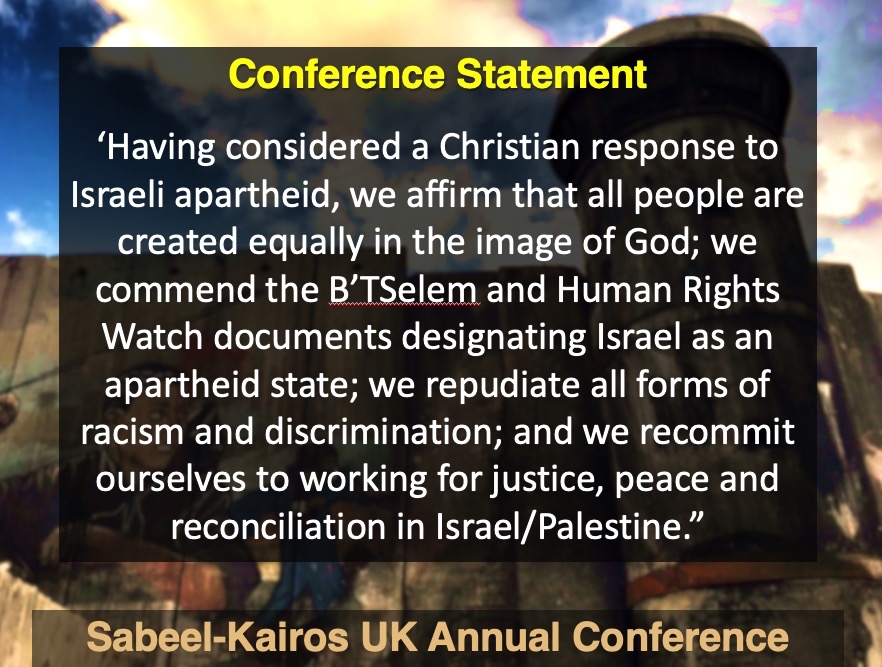
The Bible has been used in the past to justify colonisation, slavery, white supremacism, segregation and apartheid. The Bible has also been used to defend Zionism and justify Israeli apartheid. This study is intended to help you to challenge the misuse of the scriptures and bring an end to apartheid in the furtherance of justice, peace and reconciliation.
You may download a copy of this Bible Study for personal reflection or group discussion as well as a longer briefing paper on a Biblical Response to Israeli Apartheid For a more detailed examination of the biblical relationship between Israel and the Church (and deconstruction of Christian Zionism), download Seven Biblical Answers.
Questions
- Many Christians believe that God blesses people and nations who bless Israel and curses those who do not.
“The LORD had said to Abram, “Go from your country, your people and your father’s household to the land I will show you. “I will make you into a great nation, and I will bless you; I will make your name great, and you will be a blessing. ‘I will bless those who bless you, and whoever curses you I will curse; and all peoples on earth will be blessed through you.’” (Genesis 12:1-3).
2. To whom was the promise made? Is this personal blessing extended to anyone else?
3. Read Matthew 25:31-46. Some claim that Jesus promises a reward to Christians (sheep) who bless the Jewish people (these brothers of mine). In the following two passages that precede this parable, who does Jesus say are his brothers and sisters?
“And if anyone gives even a cup of cold water to one of these little ones who is known to be my disciple, truly I tell you, that person will certainly be rewarded.” (Matthew 10:42)
““Who is my mother, and who are my brothers?” Pointing to his disciples, he said, “Here are my mother and my brothers. For whoever does the will of my Father in heaven is my brother and sister and mother.” (Matthew 12:48-50)
4. Some argue that God’s people were identified by physical decent from Abraham. What do these passages teach?
“Do not despise an Edomite, for the Edomites are related to you. Do not despise an Egyptian, because you resided as foreigners in their country. The third generation of children born to them may enter the assembly of the LORD.”(Deuteronomy 23:7-8)
“I will record Rahab and Babylon among those who acknowledge me— Philistia too, and Tyre, along with Cush — and will say, ‘This one was born in Zion.’ “Indeed, of Zion it will be said, “This one and that one were born in her, and the Most High himself will establish her.” The LORD will write in the register of the peoples: “This one was born in Zion.” (Psalm 87:4-6)
5. What was the status of Gentiles?
6. From the following verses, to whom does the “Promised Land” belong?
“The land must not be sold permanently, because the land is mine and you reside in my land as foreigners and strangers.” (Leviticus 25:23)
“I brought you into a fertile land to eat its fruit and rich produce. But you came and defiled my land and made my inheritance detestable.” (Jeremiah 2:7)
“I will repay them double for their wickedness and their sin, because they have defiled my land with the lifeless forms of their vile images and have filled my inheritance with their detestable idols.” (Jeremiah 16:18)
7. What was the status of God’s people in the land? What is the difference between “freehold” and “leasehold”?
8. After the Exile who was entitled to an inheritance of land?
“You are to allot it as an inheritance for yourselves and for the foreigners residing among you and who have children. You are to consider them as native-born Israelites; along with you they are to be allotted an inheritance among the tribes of Israel. In whatever tribe foreigners reside, there you are to give them their inheritance,” declares the Sovereign LORD.” (Ezekiel 47:22-23)
9. In Isaiah 56, the Lord seems to anticipate the rise of supremacism and racism among his people, and the fear among those living further away from Jerusalem that they may be excluded. What were the criteria for admittance into the Temple?
“Let no foreigners who have bound themselves to the LORD say, “The LORD will surely exclude me from his people.” … And foreigners who bind themselves to the LORD to minister to him, to love the name of the LORD, and to be his servants, all who keep the Sabbath without desecrating it and who hold fast to my covenant— these I will bring to my holy mountain and give them joy in my house of prayer. Their burnt offerings and sacrifices will be accepted on my altar; for my house will be called a house of prayer for all nations.” (Isaiah 56:3, 6-7)
10. If God insisted that foreigners should not say “The Lord will surely exclude me from his people”, why would they say it?
11. Why does Jesus quote this passage in Matthew 21:12-13?
12. The image of the vine and branches appears frequently in the Bible. Who is the ‘vine’ in Psalm 80:14-17 and Hosea 10:1-2?
13. When Jesus said “I am the true vine” (John 15:1) what is he declaring?
14. How does Paul analogy of the olive tree in Romans 11:17-21 complement John 15?
“If some of the branches have been broken off, and you, though a wild olive shoot, have been grafted in among the others and now share in the nourishing sap from the olive root, do not consider yourself to be superior to those other branches. If you do, consider this: You do not support the root, but the root supports you. You will say then, “Branches were broken off so that I could be grafted in.” Granted. But they were broken off because of unbelief, and you stand by faith. Do not be arrogant, but tremble. For if God did not spare the natural branches, he will not spare you either.” (Romans 11:17-21)
15. How do these passages answer those who claim the Church has ‘replaced’ Israel?
16. Into what, or whom, have Gentile believers in Jesus been grafted?
17. How does Paul define a Jew in Romans 2?
“A person is not a Jew who is one only outwardly, nor is circumcision merely outward and physical. No, a person is a Jew who is one inwardly; and circumcision is circumcision of the heart, by the Spirit, not by the written code. Such a person’s praise is not from other people, but from God.” (Romans 2:28-29)
18. How does Paul define “Israel” and identify the children of Abraham in Romans 9?
“It is not as though God’s word had failed. For not all who are descended from Israel are Israel. Nor because they are his descendants are they all Abraham’s children. On the contrary, “It is through Isaac that your offspring will be reckoned.” In other words, it is not the natural children who are God’s children, but it is the children of the promise who are regarded as Abraham’s offspring.” (Romans 9:6-8)
19. Read Galatians 4:21-31. How does Paul use the analogy of Sarah and Hagar to identify the inheritors of the promises God made to Abraham?
20. From the following passages, who are God’s ‘chosen people’?
“But you are a chosen people, a royal priesthood, a holy nation, God’s special possession, that you may declare the praises of him who called you out of darkness into his wonderful light. Once you were not a people, but now you are the people of God; once you had not received mercy, but now you have received mercy.” (1 Peter 2:9- 10)
“Therefore, as God’s chosen people, holy and dearly loved, clothe yourselves with compassion, kindness, humility, gentleness and patience.” (Colossians 3:12)
21. How does Hebrews 11 explain the relationship between the Old and New Testament saints?
“These were all commended for their faith, yet none of them received what had been promised. God had planned something better for us so that only together with us would they be made perfect. (Hebrews 11:39-40)
22. Read Ephesians 2:11-22. Does God have two ‘chosen’ peoples or one?
23. What has Jesus broken down through his death? Why is it important therefore that we do not recreate racial barriers among God’s people?
Download a Pdf of this Bible study.

